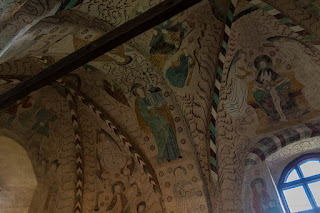The Aesthetic Appeal of Religion
 |
| Photo: Timo Rasimus |
A similar story is told within Eastern Christianity. The conversion of Russians to Christianity happened through (or with a little help of) an aesthetic experience, according to the 12th century Nestor's Chronicle. The envoys of the Prince Vladimir reported, after attending the service in Hagia Sophia in Constantinople: "We knew not whether we were in heaven or on earth." The appeal of the Orthodox liturgy has survived through the centuries. Still today, many westerners are attracted to the manifold sensuous stimuli that the Orthodox service contains: the visual imagery of the icons and liturgical vestments, the scent of incense, the mesmerizing, archaic chants, and the ambience of a dimly lit church.
There are many individual testimonies about the aesthetic appeal of religion. One could mention Augustine or Jonathan Edwards, among others. Mine is another one. I read Romans 2:4 "The goodness of God leads you to repentance" this way. It appeared to me as the answer to the question of beauty. Whence come the beauty of the nature, beautiful music, beautiful women? And I realized: it is all God's goodness that leads me to repentance! Pain, death, and injustice did not puzzle me. It was beauty that demanded explanation. I found it from God.
Soon thereafter I noticed that I had understood the Pauline words inaccurately. First, the goodness here implicates divine long-suffering - that God patiently awaits humans to repent. Second, and this appeared crucial, Christians do not enjoy beautiful things, or if they do, there is nothing spiritually advantageous therein. A righteous prayer says: " Oh Lord, help me to endure hardships" but not "Oh Lord, help me to enjoy the beauty of the world."
Where is the aesthetic appeal of Western Protestantism today? Our church buildings are tidy and functional rather than arresting and impressive, our music emulates pop music of the day (somewhat reluctantly) and our sermons intend to be acceptable rather than thrilling. However, there are still old and new hymns and prayers, and the Holy Scripture keeps on puzzling and inspiring new generations. I do not suggest that the Churches should set up some kind of aesthetic program with a panem et circenses flavor in order to attract people to the church. It is all there: in the Scripture, in the tradition, in the liturgy. We need only to be open to the beauty at hand and have some humor and imagination.
This is not a matter of artistic subtleties, but something that affects the role of Christianity in the Western culture. The aesthetic experience is the point where today's people (as the former generations, too) encounter the spiritual dimension of the reality. In my opinion, contemporary Churches are poorly prepared to the challenge of beauty. As a result, many turn to other religious traditions (or invent one of their own) when they fail to notice the comprehensiveness of Christian aesthetics.


Comments
Post a Comment